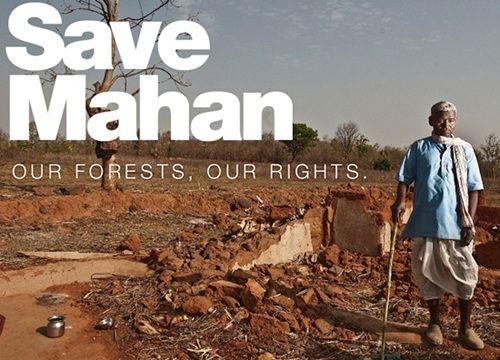'How can protecting our forests be described as anti-national and promoting the economic interests of a company like Essar Energy with its head office registered in London be called as having nationalistic sentiments?' asked Greenpeace activist Priya Pillai, who was offloaded from a flight to prevent her from speaking to British MPs about NGO activities to save the Mahan forest.
Almost every home in this area has a slogan 'Jal, Jangal, Jameen' painted outside. Rashme Sehgal reports for Rediff.com on the four-year battle to save the Mahan forest in Madhya Pradesh.

Does Greenpeace India have enough clout to be able to deprive India of foreign investment running into billions of dollars as has been made out by the Intelligence Bureau in its petition placed before the Delhi high court?
IB officials claim they 'offloaded' Greenpeace campaigner Priya Pillai at the Indira Gandhi International Airport in mid-January because her briefing of UK MPs about the efforts to save the Mahan forest would adversely impact India's international reputation.
Image: A Greenpeace balloon protesting against mining in Mahan. Image courtesy: Greenpeace.org
Pillai along with four other Greenpeace colleagues (all in their early twenties) has been fighting a rearguard battle these last four years to save the Mahan forest located in Madhya Pradesh.
The reason why Mahan remains significant is because it is India's last surviving Sal forest connecting central India with the forests of Karnataka.
Its significance was understood by two former ministers of environment and forests, Jairam Ramesh and Jayanthi Natarajan, both of whom refused to be signatories to its destruction.
Ramesh in fact wrote to the then prime minister Manmohan Singh stating, 'I am not clear why such a good quality forest should be broken up for such a partial requirement.'
'Partial requirement' was in reference to the fact that Mahan had coal availability for a short span of 14 years. Ramesh, therefore, felt there was no need to sacrifice such a rich forest for a mere 14-year mining plan.
The Sonabhadra-Singrauli region in which the Mahan forest lies is spread over both Uttar Pradesh and Madhya Pradesh. It has 11 coal mines and nine thermal power plants producing ten per cent of coal-based thermal energy in the country.
Its 11 lakh (1.1 million) population comprising largely of villagers and tribals have paid a heavy price for this energy production.
A large number of its water sources have become contaminated with mercury. Green lawyer M C Mehta filed a public interest litigation in the Supreme Court demanding the exact number of cases of mercury poisoning in both the adult and child population here.
Singrauli is presently the third most polluted cluster according to the Environmental Pollution Index prepared by the ministry of environment and forests.
The Ministry of Enviroment and Forests had asked for a moratorium in the setting up of new thermal plants and mining units in this critically polluted cluster. This moratorium was lifted under the infamous M Veerappa Moily (who served briefly as environment minister) regime much to the concern of locals.
More mines means more displacement and higher levels of toxic pollution to contend with.
"Fifty-four villages have been directly affected by the lifting of this moratorium which will result in the displacement of over 25,000 people," says Ram Lelu Singh Khewar, who owns two acres of land in the village of Budher, in the midst of the Mahan forests.
He is a member of the Mahan Sangarsh Samiti which is fighting the 'company,' a name loosely used against all the corporate houses who are seen to be taking over local land.

Almost every home in this area has a slogan 'Jal, Jangal, Jameen' painted outside, an obvious pointer to the three 'Jewels' they value most in their lives.
Greenpeace India's decision to espouse their cause has brought them into direct confrontation with these major corporate houses.
Pillai bristles with anger at having been described as anti-national. 'What is anti-national about helping tribals understand their rights? How can protecting our forests and land be described as being anti-national and promoting the economic interests of a company like Essar Energy with its head office registered in London be called having nationalistic sentiments?' she asks.
The decision of the gram sabhas in Niyamgiri to say no to bauxite mining came as a huge boost to the local tribal population living in Mahan. 'With 40 per cent of the population in the Mahan forests also being tribals, we feel we can play an active role in ensuring these forests do not face the axe,' Pillai said.
According to the Forest Tribal Act, gram sabhas can decide on whether they want to give their land to corporates. A series of gram sabhas held in Niyamgiri on the orders of the Supreme Court saw farmers voting against bauxite mining.
The farmers in Singrauli were also allowed to convene a special gram sabha in March 2013 in which they could voice a similar opinion.
But the villagers claim the gram sabha held in Mahan turned out to be a farce. While only 184 villagers signed the resolution following which the register was closed, an RTI showed the signature count to be 1,125 some of whom were names of people who were not even alive, points out Bachan Lal Shah, also a member of the Mahan Sangharsh Samiti.
Then minister for tribal affairs K C Deo wrote to both the Madhya Pradesh chief minister and the state governor, complaining against this 'fraudulent' gram sabha.
On May 12, 2014, Priya Pillai filed a writ petition in the Jabalpur high court against the non-compliance and inaction of the supreintendent of police, Singrauli, for his failure to file a First Information Report on the 'forged' gram sabha case.
Former district commissioner of this region M S Selvendran conceded that there had been 'some discrepancies in the signatures of the earlier gram sabha and that a new gram sabha must be called.'
Adds Pillai, 'We are taking strong steps against powerful people like raising the issue of false signatures. We recently won an interim plea against Essar's attempt to enforce restriction on the movement of Greenpeace activists from the district court of Waidhan.' This obviously upset the corporate houses further.
'We had also filed a case before the National Green Tribunal, but the case was dismissed because the earlier coal block allocations were cancelled,' she added.
Eight months ago, the Intelligence Bureau produced a report on foreign-funded NGOs negatively impacting economic development in India. The report described Greenpeace as being a threat to 'national economic security' due to its protests against coal plants and also nuclear energy.
The government was willing to withdraw the Look Out Circular issued against Pillai if she gave an undertaking that she would not depose before the UK parliamentary committee on human right violations.
Pillai refused to sign what she termed was a ‘gag order’.
'As a citizen of this country, I have the right to peacefully protest, talk, clearly express opinion within the laws framed by the Constitution,' she said.
Senior advocate Indira Jaising, who is fighting Pillai's case, said: 'Pillai is free to present data about the condition of the tribals. An individual can have a different view of development than what is the view of the ruling government -- that does not make you anti-national.'
The IB report named several NGOs anti-national -- ActionAid, Amnesty India and Greenpeace amongst other groups for having hurt India's economic interests.
At present 45,000 NGOs in India receive foreign funding under the Foreign Contribution Regulation Act.
Villagers living around the Mahan forests continue to express concern about how this lethal combination of power plants and coal mines has wrecked their lives especially with growing cases of deformities amongst children because of mercury poisoning.
"The forest is our mother," says Bachan Lal Shah, "without which we cannot survive. Our livelihood, our water, our air is all linked to this forest."
Over 54 villages within the 10 km radius of the coal block will be directly impacted by the mining which will see the displacement of over 25,000 people.
Nearly 100,000 people are expected to be impacted overall from which around 20,000 are from Scheduled Tribe communities like Baiga, Gond, Khairwar and Panika.
Ram Lelu Singh Kerhwar, a resident of Budher village located inside the Mahan forest, says, "I have raised all these issues with our chief minister Shivraj Singh Chouhan through a series of letters, but he did not care to reply to any of my letters which question why our politicians and bureaucrats are handing over our fast depleting reserves to corporate houses.'
The treeless landscape of Singrauli-Sonabhadra appears almost surrealistic as overburdens (hills of debris) loom in the horizon, throwing up huge gales of dust throughout the year.
While companies claim they provide substantial compensation, this is not visible on the ground. Tribal Jeetlal Vaiga, who was evicted from his home in the forest of Jharia and moved into a tin shack at the Amlori Visthapan Colony in Amlori, remains in a state of shock.
Lamenting his eviction, Vaiga says, "I am a refugee who is not longer allowed access to our forests. Life has no meaning for me anymore."
Priya Pillai insists that speaking up for the cause of the dispossessed remains a cause worth fighting for.
REDIFF RECOMMENDS










